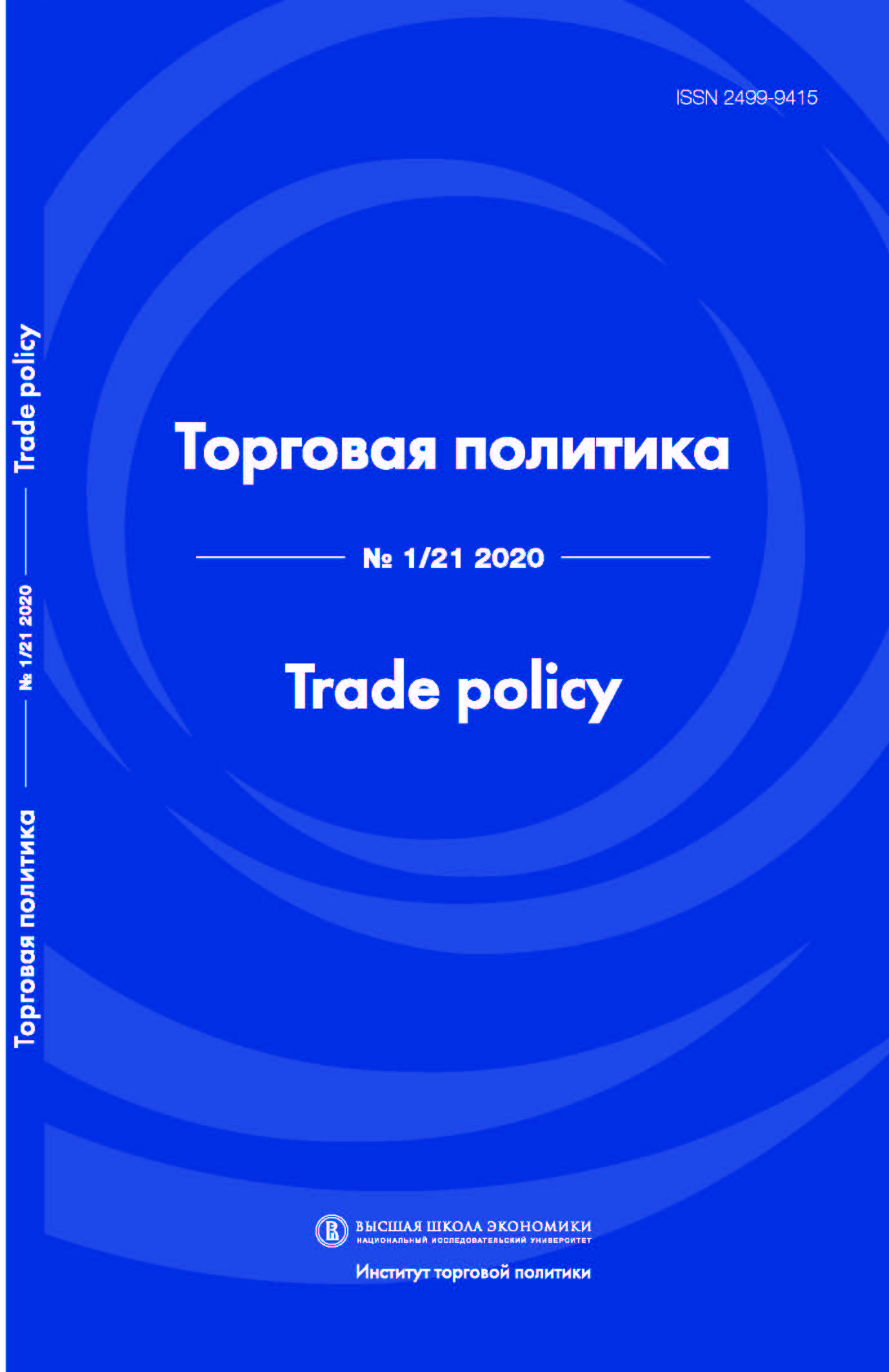The EU-MERCOSUR trade agreement and its impact on the economies of participating countries
Keywords:
EU, MERCOSUR, trade liberalization, trade agreements, exports, imports
Abstract
The paper considers the possible impact of the trade agreement between the EU and MERCOSUR on the structure of bilateral trade between these blocks. Changes in trade between the parties to the agreement with third countries as a result of increased trade between the EU and MERCOSUR after reducing the level of mutual tariff barriers were also studied. Various aspects of the prospects for the operation of this agreement were considered.
Downloads
Download data is not yet available.
References
[1] URL: .
[2] Client and Supplier Countries of the EU27 in Merchandise Trade (value%) (2019, excluding intra-EU trade) // European Comission.
URL:.
[3] Comercio por Paises // Mercosur. URL:.
[4] Bulmer-Thomas V. The European Union and MERCOSUR: Prospects for a Free Trade Agreement // Journal of Interamerican Studies and World Affairs. 2000. Vol. 42. No. 1. P. 1–22.
[5] Get tariff data // World TradeOrganization URL:.
[6] Bilateral framework agreements for cooperation with the Mercosur countries // EUR-Lex URL:.
[7] Interregional Framework Cooperation Agreement between the European Community and its Member States, of the one part, and the Southern Common Market and its Party States, of the other part // EUR-Lex URL:.
[8] EU-Mercosur: European Commission adopts Regional Programme in support of further Mercosur integration // European Commission. URL:.
[9] Laborde D., Ramos M. P. Will regionalism survive multilateralism? The EU-MERCOSUR example // The 10th Annual Conference on Global Economic Analysis “Assessing the Foundations of Global Economic Analysis”organized by GTAP and Purdue University. 2007. P. 1–39.
[10] Sanahuja J. A., Rodriguez J. D. Veinte anos de negociaciones Union Europea-Mercosur: Del interregionalismo a la crisis de la globalizacion // Documentos
de Trabajo. 2019. No. 13.
[11] EU-Mercosur trade agreement: The Agreement in Principle and its texts //European Commission URL:.
[12] The agreement in principle // New EU-Mercosur trade agreement. URL:.
[13] Ghiotto L., Echaide J. Analysis of the agreement between the European Union and the Mercosur. Berlin, 2019.
[14] Bridges for Trade and Sustainable Development // EU-Mercosur Trade Agreement. URL:.
[15] Aguiar A., Chepeliev M., Corong E., Mcdougall R., Van Der Mensbrugghe D. The GTAP Data Base: Version 10 // Journal of Global Economic Analysis.2019. Vol. 4. No. 1. P. 1–18.
[16] Nein zu Mercosur: Osterreicher machen Ernst // Deutsche Welle. URL:.
[17] Austria blocks EU-Mercosur trade deal with South America // BBC. URL:.
[18] Macron Opposes Mercosur Trade, Saying Brazil ‘Lied’ on Climate// Bloomberg. URL:.
[19] The Brief — Uphill battle for EU-Mercosur pact // Euractiv. URL:
[20] Acuerdo UE-Mercosur: “Imposible no ver los impactos negativos”// Deutsche Welle. URL:.
[21] South American tensions threaten Mercosur trade deal // FinancialTimes. URL:.
[22] La fragilidad del acuerdo Mercosur-UE // Infobae. URL:
[23] El acuerdo UE-Mercosur: ^quien gana, quien pierde y que significa el acuerdo? // Fundacion Real Instituto Elcano. URL:.
[24] Los proximos pasos del acuerdo Mercosur-UE // Clarin.com. URL:.
[25] Creating Opportunities while Respecting the Interests of European Farmers// EU-Mercosur Trade Agreement. URL:.
[26] RTAs in force // World Trade Organization. URL:.
[2] Client and Supplier Countries of the EU27 in Merchandise Trade (value%) (2019, excluding intra-EU trade) // European Comission.
URL:
[3] Comercio por Paises // Mercosur. URL:
[4] Bulmer-Thomas V. The European Union and MERCOSUR: Prospects for a Free Trade Agreement // Journal of Interamerican Studies and World Affairs. 2000. Vol. 42. No. 1. P. 1–22.
[5] Get tariff data // World TradeOrganization URL:
[6] Bilateral framework agreements for cooperation with the Mercosur countries // EUR-Lex URL:
[7] Interregional Framework Cooperation Agreement between the European Community and its Member States, of the one part, and the Southern Common Market and its Party States, of the other part // EUR-Lex URL:
[8] EU-Mercosur: European Commission adopts Regional Programme in support of further Mercosur integration // European Commission. URL:
[9] Laborde D., Ramos M. P. Will regionalism survive multilateralism? The EU-MERCOSUR example // The 10th Annual Conference on Global Economic Analysis “Assessing the Foundations of Global Economic Analysis”organized by GTAP and Purdue University. 2007. P. 1–39.
[10] Sanahuja J. A., Rodriguez J. D. Veinte anos de negociaciones Union Europea-Mercosur: Del interregionalismo a la crisis de la globalizacion // Documentos
de Trabajo. 2019. No. 13.
[11] EU-Mercosur trade agreement: The Agreement in Principle and its texts //European Commission URL:
[12] The agreement in principle // New EU-Mercosur trade agreement. URL:
[13] Ghiotto L., Echaide J. Analysis of the agreement between the European Union and the Mercosur. Berlin, 2019.
[14] Bridges for Trade and Sustainable Development // EU-Mercosur Trade Agreement. URL:
[15] Aguiar A., Chepeliev M., Corong E., Mcdougall R., Van Der Mensbrugghe D. The GTAP Data Base: Version 10 // Journal of Global Economic Analysis.2019. Vol. 4. No. 1. P. 1–18.
[16] Nein zu Mercosur: Osterreicher machen Ernst // Deutsche Welle. URL:
[17] Austria blocks EU-Mercosur trade deal with South America // BBC. URL:
[18] Macron Opposes Mercosur Trade, Saying Brazil ‘Lied’ on Climate// Bloomberg. URL:
[19] The Brief — Uphill battle for EU-Mercosur pact // Euractiv. URL:
[20] Acuerdo UE-Mercosur: “Imposible no ver los impactos negativos”// Deutsche Welle. URL:
[21] South American tensions threaten Mercosur trade deal // FinancialTimes. URL:
[22] La fragilidad del acuerdo Mercosur-UE // Infobae. URL:
[23] El acuerdo UE-Mercosur: ^quien gana, quien pierde y que significa el acuerdo? // Fundacion Real Instituto Elcano. URL:
[24] Los proximos pasos del acuerdo Mercosur-UE // Clarin.com. URL:
[25] Creating Opportunities while Respecting the Interests of European Farmers// EU-Mercosur Trade Agreement. URL:
[26] RTAs in force // World Trade Organization. URL:
Published
2020-07-31
How to Cite
levykinaA. (2020). The EU-MERCOSUR trade agreement and its impact on the economies of participating countries. Trade Policy, 1(21), 44-77. Retrieved from https://tpjournal.hse.ru/article/view/11199
Section
Forecasting and Simulation: Models and Applications F47

